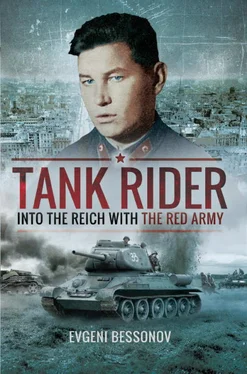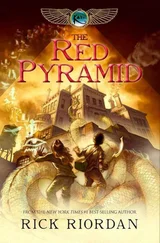The Germans abandoned their positions and fled from the village. I do not remember the names of all those villages; there were many such villages along the route of our advance. If they had fled, that meant that they would put up a more stubborn resistance elsewhere. The closer we came to Berlin, the stiffer German resistance became, but they had fewer heavy Tiger and Panther tanks. They started to use more of the weak assault guns and Panzerfausts .
On 21 April our Brigade came up to the town of Zauhvitz and the action that followed lasted all day long. The Germans found a perfect defensive position. The terrain in front of the town was swampy and impassable for tanks; it was also impossible to dig in and hard to assault across the swamp – it was a quagmire. This swamp stretched some 300 or 400 metres before the town. The Germans placed tanks behind houses, set guns to fire over open sights, built up machine-gun nests and carefully placed snipers – they hit us hard. We were already used to going into battle with tanks and felt quite uncomfortable without them. It was one thing when a tank, a huge machine, was advancing toward the Germans, firing its main gun and machineguns, and the enemy already felt uncomfortable, but it was quite another when we assaulted only with infantry. The Germans had machine-guns, mortars and all this was against lightly armed Soviet soldiers. We assaulted the small town of Zauhvitz straight from the march, without any clear directions – the order was just to go and capture it. Such things often happened. We deployed in an attacking line and moved towards the German defences as quickly as possible, running, before the Germans opened fire. We tried to run forward, as it is harder to hit moving targets. All of a sudden all the enemy’s weapons opened fire, and the snipers started their work. In such moment a soldier wants to lie down, but I ordered ‘Forward! Don’t stop!’ and myself advanced forward in short rushes. We had our first casualties. The soldiers moved forward in short rushes, but as the firing intensified, they just lay down, seeking cover and a more or less dry spot, where you could dig in. I saw the 2nd and the 3rd companies also ceasing their attack on our right flank; we did not have anyone on our left flank. The ‘Slavs’ were pinned down, and it would be hard to get them up and attack. Even more so now the snipers were active – they fired at any move in our line. You could not stand up so we had to sneak on the ground. Drozd and I crept to some house and dug in behind it. I wanted to go into the house, but they warned me not to do it – the whole ground had been presighted by the Germans. I exchanged opinions with my squad leaders, and they proposed that we stayed put. I also decided to take my time and wait for artillery support from our side, a Katyusha salvo. These were not old men of the Volkssturm defending the ground in front of us, but experienced German troops, probably even Vlasov’s troops, with whom we had already had encounters. I ordered the evacuation of the wounded and they were carried by men crawling to the forest behind us. The medical platoon’s vehicle with Dr. Pankova and the medics were somewhere over there. The enemy turned out to have more forces than our command thought. It was impossible to capture the town on an important road junction with just infantry without artillery support – this was exactly what I said in my report to the battalion commander’s orderly and then to the deputy chief of staff of our battalion Senior Lieutenant Michael Romanov. He sneaked out to us, and then Drozd and I were barely able to send him back safely – German fire was intensive, but we knew safe routes of retreat. I showed Romanov what a daytime assault would be like. Of course we could assault and all get killed there, but what would be the point? Who would go on to Berlin? Why on earth did I have to attack without any support, send my guys to a certain death and be killed myself before the end of the war? Why the hell did I need this? Where were the artillery, mortars, Katyushas – they had been silent for a long time, it was time for them to act! There was no artillery support, but I was supposed to have it! Tanks did not support us either, they were cowering from enemy fire. An instruction from the battalion commander came a bit later. It said that I should stay put and wait for further orders. They had finally understood that one had to fight the war skilfully using all the resources at one’s disposal. Where were company commander Chernyshov and platoon leaders Mikheev and Guschenkov? Again I had to lead the whole company, not just my platoon. There was absolutely no co-ordination between the companies of our battalion in that battle. I cannot say anything about the other battalions.

They brought the battalion’s artillery to us – two 57 mm guns that the crews man-handled forwards. They put their guns behind the company, in a small forest. Then an SU-85 self-propelled gun arrived; apparently it was from the Corps’ armour regiment, but I did not know the guys in its crew. However, the gun did not manage to fire a single shot, as a spare fuel tank on its back part caught fire. The vehicle could have been saved by merely dumping the fuel tank on the ground, but the gun crew did not even try to do it. Our battalion’s artillery crews fired several rounds on targets in the town and even knocked something out. I was observing the enemy when a mine exploded on the breastwork of my foxhole and the edge of the foxhole even collapsed. I was buried in it, and who knows where the mine splinters flew. Everything was all right, although the mine fell only a foot short of the foxhole. I was not killed – again I was lucky, which happened time and again in that war. My orderly Drozd, who had been in another foxhole, crawled up to me, dug me out, checked if I was wounded by splinters and told me that I was lucky. I had bells ringing in my head for several days, but later the ringing disappeared.
In this manner we spent almost the whole day. Finally, in the late afternoon our artillery opened heavy fire and the Katyushas fired several salvos. We also received an order to go into action. I got my company up and the neighbouring units also joined our assault. The enemy did not fire so intensively any more, and under the cover of our artillery we quickly reached the outskirts of the place. It was already growing dark. We quickly walked through the town and reached the opposite side of it; the enemy was retreating, returning fire at us. It was hard to walk in the streets, as they were barricaded with heaps of roof tiling that fell from the roofs. Artillery and mortar crews did a great job, the enemy suffered significant losses. They should have done this a long time before, then we would not have had to lie the whole day hungry in a swamp under enemy fire.
The soldiers, excited by the battle, shared their joys. We felt like having a snack, but the ‘Mount the tanks!’ order came and we moved on forward to finish off the enemy. A dark night fell. We had a snack with what we had managed to grab from the houses. There was no time to relax, we had been delayed in front of Zauhvitz, but after we captured it, the roads to west and north-west were open.
The night march from Zauhvitz went well, we just drove through some villages without dismounting tanks, sometimes opening fire from the tanks, and sometimes merely kicking the Germans out of our way, and rushed forward, without delaying and engaging the enemy.
Before that, from 22 to 24 April, the Brigade and the battalion captured Spremberg, Velzov and other towns. In late April the Brigade captured Calau, Luckau, Dahme, Belzig, Luckenwalde, Lehnin, Brandenburg, Ketzin and Potsdam in three or four days.
Читать дальше













